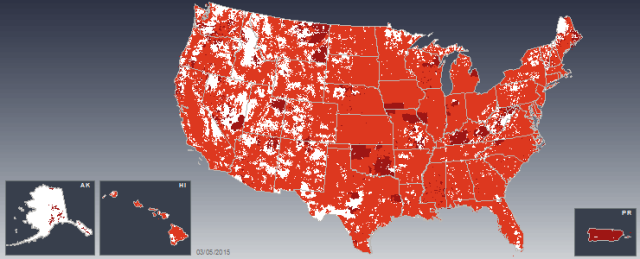
Got a data cap on your smartphone? You should be grateful, according to an opinion piece that Verizon Wireless published on Friday.
"Let’s face it, if everyone had unlimited data and used it fully, the performance of the networks would suffer because of bandwidth restrictions and the 'shared resource' nature of wireless," industry analyst Jack Gold, founder of J. Gold Associates, wrote in an article titled "The Lure of Unlimited Wireless Data—Is It Necessary?"
Gold went on to write that customers have shifted high-bandwidth activities to Wi-Fi networks, where usage doesn't count against cellular data caps, and that "users are very well served by current wireless data plans, and really don’t require more. So, while unlimited data may sound attractive, there is no practical effect of data limits on the majority of users."
Verizon included a disclaimer saying that Gold's views "may not necessarily reflect those of Verizon Wireless," but it's unlikely that Verizon would have published a piece arguing that carriers should supply everyone with unlimited data.
Some of Verizon's rivals do sell unlimited plans, however. While Sprint and T-Mobile US offer unlimited data to new mobile customers, there's no such option from Verizon Wireless and AT&T.
The main reason is no secret: data caps let wireless carriers charge higher prices for bigger monthly allotments and charge overage fees when customers exceed their caps. Sprint and T-Mobile offer better deals than their bigger rivals to lure away customers but face an uphill battle because the two biggest carriers control the best spectrum and thus have stronger networks.
Monthly data limits can help prevent congestion, to a point. But as we've previously explained, caps are less effective than other methods because they impose limits even when users aren't in congested areas or using the network at peak usage times. Carriers do have systems that throttle speeds only during times and places of congestion, making it clear that caps are more about creating differentiated pricing tiers than keeping the network running smoothly.
BGR writer Brad Reed did a good job analyzing Gold's argument:
Where Gold really reveals how stupid he thinks we are, however, is when he explains why we shouldn’t even want Verizon to upgrade its network to handle this increased traffic.
“Invariably, degraded networks would cause the carriers to seek upgrades to their networks to increase capacity,” he writes. “Much like highways that need to be widened for peak rush-hour traffic, this would require major investments that someone would have to pay for—that someone being the subscribers.”
This is ridiculous. If subscribers were really that fearful of price increases then they should have been begging Verizon to never upgrade from 3G to 4G. After all, the upgrade to LTE was a major investment and according to Gold, major investments are something wireless users should be fearful of.
Competition is the greatest factor influencing the pricing and allotment decisions carriers make. Late last year, AT&T and Verizon each doubled the data available on certain plans to match a promotion from Sprint. The ability to double data allotments at a moment's notice in response to a competitor's offering suggests that carriers have plenty of capacity.
Some longtime Verizon and AT&T customers are lucky enough to still have unlimited data through plans grandfathered from the time before the carriers started imposing data caps. But there's a catch: some of the unlimited plans are throttled once customers hit a monthly limit decided by the carrier.
Verizon throttles 3G users with unlimited data plans when they exceed 6.5GB per month and connect to congested cell towers but agreed not to throttle 4G users after criticism from FCC Chairman Wheeler last year. AT&T still throttles its unlimited LTE users when they exceed 5GB a month, even when they're not in congested areas. AT&T says it will change its system some time in 2015, but it is fighting a Federal Trade Commission lawsuit that seeks to return money to throttled customers.
Throttling appears to serve a business purpose rather than being strictly about network management. Verizon's throttling typically kicks in at around 6.5GB, but customers can purchase more expensive limited plans that provide tens of gigabytes without any slowdown.
Wheeler accused the company last year of trying to boost profits under the guise of "reasonable network management."
"'Reasonable network management' concerns the technical management of your network; it is not a loophole designed to enhance your revenue streams," Wheeler wrote to Verizon in July 2014. "It is disturbing to me that Verizon Wireless would base its 'network management' on distinctions among its customers' data plans rather than on network architecture or technology."
reader comments
228